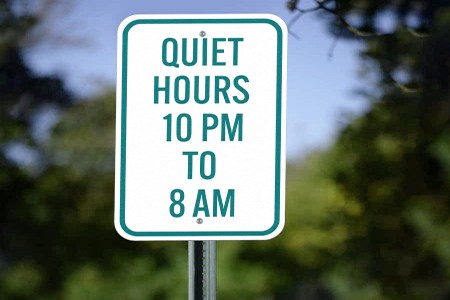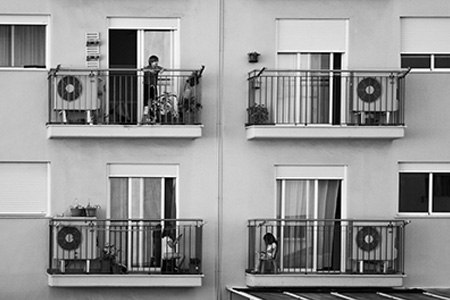How to Defend Yourself Against Noise Complaints
Author: Rick Worst | Editor: Omar Alonso
Review & Research: Jen Worst & Chris Miller

Did you receive a noise complaint? Maybe your landlord or neighbors filed against you with the authorities. Whatever happened, now you're dealing with the fallout and a possible legal problem. Fortunately, you have options to protect yourself. Here's how to defend yourself against noise complaints.
Before we start, if you're planning a party and you think there might be noise at your place people might find irritating, it's best to take preventative measures before the event. For instance, you can warn the landlord or neighbors of the coming noise, ask your landlord or police to give you a warning instead of filing against you and check for quiet hours to know when to end the fun.
However, if it's too late and people have filed a complaint against you, it's important to know your rights and what you can do about the situation. Knowing where you stand lets you assess the validity of the claim. If you don't know your rights, you'll have to hire a noise complaint attorney to assist you with navigating the process.
How Do You Defend Yourself Against a Noise Complaint?

A noise complaint is a formal filing against you for distributive or excessive noise. People can lodge these complaints to your landlord if you rent to property, or they may choose to do so with the police.
Noise complaint legislation is typically part of state or local law, and most landlords will write terms into lease agreements. Depending on the severity of the problem, you might receive a warning, a fine, or other consequences.
Most noise complaints occur at night, against people playing loud music or making a noise in their residence or outside. Examples would be the neighbors sitting in their backyard playing loud music or a large group shouting and carrying on with disruptive behavior.
Ethical responsibility and pragmatic behavior are the best ways to avoid having someone file a noise complaint against you. Not making extreme noise is always the first step. Pre-warnings and apologies go a long way if you can't avoid making noise for some specific reason.
Ways to Protect Yourself from Receiving a Noise Complaint
You can use strategies to prevent yourself from receiving a noise complaint. There are also tactics available to help you navigate the process if someone files against you. Let's unpack your options.
Observe Quiet Hours

Most towns and neighborhoods use "quiet hours" to list times of the evening when you may not make disruptive noise. These noise ordinances are also observed and set by apartment complexes. Typically, quiet hours are set between 10 PM and 8 AM as to not disrupt people's sleep.
Quiet hours are there to keep the community peaceful. For instance, you have a loud party on a Wednesday evening to celebrate your birthday and it drags on late and becomes rambunctious.
In this case, your neighbor might not know why the noise is occurring. They'll complain to you after midnight because they have work in the morning. Most "quiet hours" start at 10 pm on weekdays and midnight on weekends.
If you're making a noise past these times, you'll likely receive a noise complaint from your surrounding neighbors, but you might not know who lodged it against you. In this case, you'll be violating a "nuisance order."
This behavior could result in your landlord canceling your lease and evicting you from the property or a fine for homeowners. Plan your event around quiet hours to ensure you comply with nuisance laws. Quiet hours are not always enforced or stipulated in states, towns, and cities. Know the local laws and our rights.
Give the Neighbors Advanced Warning

If you're having a party at your place and it's a one-off thing, like a 30th birthday, you can have the courtesy to the people around you and warn your neighbors that they can expect a bit of noise. Tell them you'll try to shut it down at midnight if you think it will go on late.
You'll find it surprising how forgiving people are if you have the decency to give them some warning ahead of time. In most cases, it should prevent them from filing a formal complaint against you.
Give your neighbors your phone number if they don't have it, and ask them to call you if they're feeling frustrated rather than call the police.
Ask the Police or Landlord for a Warning
If you don't have a history of creating a disturbance, you could tell your landlord or the police to give you an advanced warning. Even if you make your neighbors aware of the situation, there's a chance they'll file against you anyway. Some people are nasty and look for any opportunity to complain and get you in trouble.
Be proactive with the situation and call the landlord and the cops. Tell them you're planning the birthday party and it might get noisy. Give them your number and ask them to contact you first instead of visiting the property. If they call, shut it down before they arrive to enforce the law. When they arrive, apologize profusely and ask for a warning because you're not a trouble-maker.
Apologize to Avoid Action Against You
If the police or landlord arrive on the scene, take control and make an apology. Tell them you didn't intend things to get out of hand and that you'll shut it down. As long as you don't have a history of noise disturbances, most people will give you a warning and walk away.
This is the key even for dealing with unreasonable noise complaints. This forces people who want to be in control or who perceive themselves as being disrespected to "become the bad guy" if they continue to pursue it after you've apologized and been as kind as possible.
Know Your Rights in a Noise Complaint Scenario

Please understand that none of this constitutes legal advice on how to defend yourself against noise complaints. We are not legal experts though we will cite our references. Please consult a lawyer regarding the validity of anything you read online.
If the Landlord Arrives
If you're renting from a landlord, they have a right to enter in case of a noise disturbance. However, most of them will likely rather call the police than take the chance of walking into a dangerous situation they can't control.
However, if your landlord lives on the adjacent property or has a relationship with you, they'll likely intervene on-site. In many cases, the landlord has an obligation to show up and see what's going on. The tenant's rights depend on the lease agreement and state laws.
If the Police Arrive
If the police show up to check on the problem, they don't have the right to enter your home without a search warrant (unless the noise was related to suspected domestic abuse). They can stand on the threshold and ask to speak to you. However, the cops won't know what kind of situation they're arriving at, so you can expect them to be on full alert.
Don't be aggressive with the police. If you cause a scene, the situation will escalate. The cops are there to enforce the law, and you are in the wrong (is the safest assumption for them). Being compliant is the best way to avoid a problem that could result in the police possibly arresting you.
If the Neighbor Arrives
If the neighbor decides to visit your property, you don't have to answer them at the door. They have no right to tell you what to do. However, disrespecting your neighbors could damage your relationship with them, causing problems for you in the future.
Some neighbors may arrive at your property aggressively. They may threaten you or have weapons on them. If that's the case, call the police. If a neighbor experiences bad treatment from you, you can almost guarantee they'll file a complaint.
Determine the Validity of the Noise Complaint

You might sometimes receive a noise complaint against you for doing something irrelevant, like being a bit rowdy in your backyard at a mid-afternoon BBQ.
Some neighbors can be overly ignorant of the law, and they might decide to file a complaint with your landlord or the cops for a minor transgression of what they believe to be their right to peace and quiet.
In this case, you'll need to analyze the validity of their complaint. Here are a few tips for assessing the situation and then deciding how to go about dealing with unreasonable noise complaints.
Valid Nuisance & Noise Complaints
- If you're playing loud music at any time of the day, especially during quiet hours
- Partying in a property where several people are making noise or being a nuisance
- Barking dogs that cause a disturbance of the peace
- Excessively loud talking or screaming
Invalid Nuisance & Noise Complaints
- The sound of running water
- Footsteps in common areas or squeaky floors at night.
- Gatherings that end before the start of quiet hours
- Infants crying at night
- Hearing your squeaky metal bed frame when you shift around in your sleep
Be honest with yourself whether you're being loud and inconsiderate or if the other person is simply trying to stir up a problem. Clarity will help you stay calm and navigate this event for the best outcome.
Never become angry or seek revenge. You always want to deescalate the situation. Nobody wants to hear you being inconsiderate late at night any more than you want to hear cricket noises at night.
Tips to Avoid Noise Complaints Against You

The best way to avoid receiving a noise complaint is to be proactive with your behavior and prevent it from happening in the first place. Follow these tips to avoid getting into trouble.
Check Quiet Hours & Warn Neighbors/Police
Check quiet hours in your area and warn the police and neighbors about your intentions beforehand. Be courteous to your neighbors and give them advanced warning. Once people understand you're having a one-time special event and you've asked for their patience, they're far more likely to let you have your fun.
Check the Volume Level of the TV or Sound System
Adjust your TV volume or sound system to normal levels, and don't make a noise during quiet hours. Don't sit in your driveway playing music on a loud car stereo system. As much as we enjoy them, keep your subwoofer volume low at the intended levels (or better yet, don't have a subwoofer in an apartment at all).
Have a Party at Another Venue
Take your party to another venue and avoid having to deal with noise complaints for rowdy behavior. Parks are available for cookouts. Restaurants and bars are great for adult gatherings. There are endless options where your neighbors will never hear you. And remember, they don't want to hear you any more than you want your neighbors looking in your windows.
Host Gatherings During the Day
Invite people over during the day before quiet hours start. Yes, this can be difficult when most people work during the day, but if it's the weekend you're in the clear. You'll be able to make reasonable amounts of noise and have no concerns about getting in trouble.
Dealing With Unreasonable Noise Complaints is Still Tough
If you're facing a noise complaint from the police, landlord, or neighbors, you may have legal rights protecting you from being evicted or fined. Unfortunately, you'll need to hire a professional to help you navigate the legal environment involved with the case.
Look for a qualified and experienced attorney with a solid track record of success defending people against invalid noise complaints. They'll consult with you and discuss your case's validity and legal defense. The help of a professional is how to defend yourself against noise complaints with the best hope of a good resolution.



